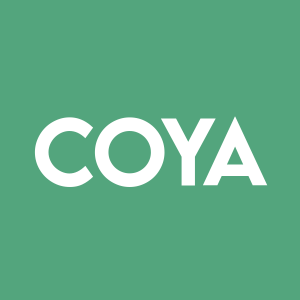Welcome to our dedicated page for Coya Therapeutics news (Ticker: COYA), a resource for investors and traders seeking the latest updates and insights on Coya Therapeutics stock.
Coya Therapeutics, Inc. (NASDAQ: COYA) is a clinical-stage biotechnology company headquartered in Houston, Texas, with news flow centered on its regulatory T cell (Treg)–focused pipeline for neurodegenerative and inflammation-driven diseases. Company updates frequently highlight progress with COYA 302, an investigational proprietary biologic combination of low-dose interleukin-2 (LD IL-2) and CTLA-4 Ig, and COYA 303, an investigational combination of LD IL-2 and a GLP-1 receptor agonist.
Investors following COYA news can expect regular coverage of clinical trial milestones, including the Phase 2 ALSTARS Trial of COYA 302 in amyotrophic lateral sclerosis (ALS). Coya has announced key events such as FDA acceptance of its IND for COYA 302 in ALS, Health Canada’s acceptance of a Clinical Trial Application, initiation and dosing of patients in the ALSTARS Trial, and milestone payments received under its Development and License Agreement with Dr. Reddy’s Laboratories Ltd.
News items also describe regulatory developments for frontotemporal dementia (FTD), including FDA acceptance of an IND for COYA 302 in FTD and results from an investigator-initiated open-label study of low-dose IL-2 and CTLA4-Ig in FTD patients. Additional releases cover preclinical data for COYA 303 in an in vivo model of systemic and neurologic inflammation, corporate financing activities such as an upsized public offering of common stock, and quarterly financial results and corporate updates.
This COYA news page aggregates these disclosures so readers can review clinical, regulatory, scientific, and financing announcements in one place. For those tracking Treg-based approaches to ALS, FTD, Alzheimer’s disease, and related conditions, the news stream provides direct access to Coya’s reported data, trial status updates, and key corporate events over time.
Coya Therapeutics (NASDAQ: COYA) reported Q3 2025 results and a corporate update: the FDA accepted the IND for COYA 302 in ALS and Coya launched the Phase 2 ALSTARS trial (NEALS-affiliated). The company received a $4.2M milestone from Dr. Reddy’s and closed an upsized public offering of $23.0M, extending cash runway into 2H 2027. Cash and equivalents were $28.1M at September 30, 2025. Q3 collaboration revenue was $3.6M (including $3.3M license revenue on IND acceptance). R&D expenses were $2.9M, G&A $2.6M, and net loss was $2.1M for the quarter.
Coya Therapeutics (NASDAQ: COYA) reported results from a completed in vivo mouse study of its investigational combination COYA 303 (low-dose IL-2 + GLP-1 receptor agonist) in a lipopolysaccharide (LPS) model of systemic and neurologic inflammation on November 4, 2025. The company said COYA 303 reduced peripheral pro-inflammatory cell expansion, enhanced regulatory T cell (Treg) activation and function, attenuated CNS inflammation, and shifted monocytes/macrophages toward an anti-inflammatory phenotype versus controls.
Coya noted the study confirmed interim findings, used daily LPS injections for five days with COYA 303 given for four days, and plans to publish a full dataset. Management linked these preclinical effects to potential development in neurodegenerative and autoimmune diseases and referenced upcoming semaglutide Alzheimer’s trial readouts as strategic context.
Coya Therapeutics (NASDAQ: COYA) closed an underwritten public offering raising approximately $23.0 million through the sale of 4,181,818 shares of common stock at a public offering price of $5.50 per share, including 545,454 additional shares sold upon full exercise of the underwriter’s option.
The company said gross proceeds were approximately $23.0 million before underwriting discounts, commissions, and offering expenses. Coya intends to use net proceeds for working capital, general corporate purposes, and to fund its clinical development plan. Lucid Capital Markets served as book-running manager.
Coya Therapeutics (NASDAQ: COYA) priced an underwritten public offering of 3,636,364 shares of common stock at $5.50 per share, with gross proceeds expected to be approximately $20.0 million. The company granted the underwriter a 30-day option to purchase up to 545,454 additional shares at the offering price, subject to underwriting discounts and commissions.
The offering is expected to close on or about October 27, 2025, subject to customary closing conditions. Net proceeds are intended for working capital and general corporate purposes, including funding Coya's clinical development plan. The shares are offered under a Form S-3 shelf registration declared effective August 19, 2025.
Coya Therapeutics (NASDAQ: COYA) announced a proposed underwritten public offering of common stock on October 23, 2025.
The offering may include a 30-day underwriter option to purchase up to an additional 15% of the shares at the offering price, less discounts and commissions. Proceeds are intended for working capital and clinical development. Lucid Capital Markets is sole book-running manager.
The offering is being made under a shelf registration statement on Form S-3 (File No. 333-289511) declared effective by the SEC on August 19, 2025; final terms will be disclosed in a prospectus supplement and are subject to market and other conditions.
Coya Therapeutics (NASDAQ: COYA) congratulated scientific advisor Dr. Shimon Sakaguchi on receiving the 2025 Nobel Prize in Physiology or Medicine for the discovery of regulatory T cells (Tregs). The company noted Dr. Sakaguchi’s long-standing advisory role guiding Coya’s strategy to harness and enhance Treg biology for therapies targeting immune dysfunction. Coya emphasized the Nobel recognition as validation of Treg science and said it remains committed to advancing therapies inspired by that discovery.
Coya Therapeutics (NASDAQ:COYA) has completed patient enrollment in an investigator-initiated, open-label study evaluating a combination treatment of low-dose IL-2 and CTLA4-Ig in patients with mild to moderate Frontotemporal Dementia (FTD). The study, conducted at Houston Methodist Neurological Institute, has successfully enrolled all 9 planned patients.
Following positive interim results from 5 patients announced in April 2025, the trial added 4 more patients. The treatment involves subcutaneous CTLA4-Ig administration followed by a 5-day course of low-dose IL-2 every four weeks, for 22 weeks of dosing and follow-up. The study has reported no serious adverse events or safety-related discontinuations and is expected to complete in Q4 2025 with topline results to follow.
Coya Therapeutics (NASDAQ:COYA) has launched the ALSTARS Trial, a Phase 2 clinical study evaluating COYA 302 for treating Amyotrophic Lateral Sclerosis (ALS). The trial is designed as a randomized, multi-center, double-blind, placebo-controlled study spanning 24 weeks.
Key trial details include:
- Enrollment of 120 ALS participants across approximately 25 centers in the US and Canada
- Two different COYA 302 dosing groups plus placebo
- Additional 24-week blinded extension period where all participants receive COYA 302
The study focuses on COYA 302's mechanism of enhancing regulatory T cell function in patients with neurodegenerative disorders.
Coya Therapeutics (NASDAQ:COYA) reported promising preclinical results for COYA 303, its investigational combination therapy of LD-IL-2 and GLP-1RA, in a mouse model of systemic and neuroinflammation. The study demonstrated significant anti-inflammatory effects both systemically and in the central nervous system.
The first cohort results showed that COYA 303 effectively reduced pro-inflammatory myeloid cells, increased anti-inflammatory immune cells, and attenuated neuroinflammation in the brain. The therapy showed particular promise in enhancing regulatory T cell (Treg) function and survival in inflammatory environments, supporting its potential application in treating Alzheimer's Disease and other neurodegenerative conditions.
The company is currently conducting additional cohort studies to evaluate modified treatment protocols, with plans to present complete findings in a peer-reviewed forum.
Coya Therapeutics (NASDAQ: COYA) announced that its Phase 2 clinical trial for COYA 302 in ALS patients has been accepted as a NEALS-Affiliated Trial by the NEALS Consortium, the world's largest ALS research network. The trial, following FDA's recent IND acceptance, is scheduled to begin in Q4 2025.
The study will be presented during the NEALS Educational Webinar on September 29, 2025, by Dr. James Berry from Mass General Hospital. As a NEALS-affiliated study, COYA 302's trial will receive broad support across NEALS' institutional and community networks, enhancing operational execution and clinical impact.


